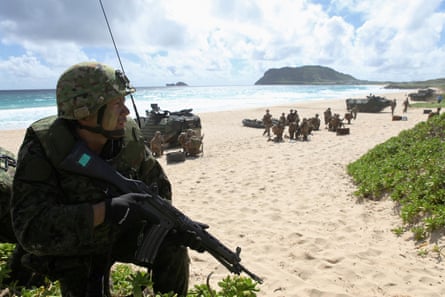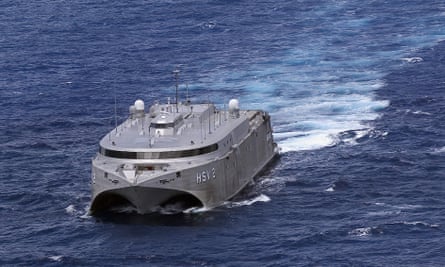
‘Bombs Can’t Kill Viruses’: Hawaii Faces Backlash as International War Games Approach
Jon Letman / The Guardian UK
(August 13, 2020) —In a year when the coronavirus has caused multinational war games to be conducted virtually or canceled, the world’s largest international maritime military exercise begins in Hawaii next week.
The Rim of the Pacific (RIMPAC) war games, which run through the end of August, come as Hawaii struggles to contain community spread of the coronavirus amid what has become the highest reproduction rate in the country.
Critics of the exercise have protested against RIMPAC for years, citing environmental degradation, increased sexual exploitation during military “liberty” port visits, the unwanted militarization of indigenous land, water and air, and now fear of increased Covid-19 risk.
In March, members of the Cancel RIMPAC Coalition wrote: “Bullets and bombs are useless against viruses.” Last week in Honolulu, even as war ships sailed for Hawaii, members of the coalition delivered a petition with over 12,000 signatures calling for Hawaii’s governor, David Ige, to cancel the exercise.
After Ige, a consistent RIMPAC supporter, requested a delay in April, RIMPAC was postponed until August. At the time, many expected the virus would be gone by late summer, but Hawaii’s case number has soared from less than 1,000 in early July to nearly 4,000 in the first half of August.
This week, after being criticized for its lack of transparency, US Indo-Pacific Command revealed that military personnel and their families made up 7% of Hawaii’s infections.
Coronavirus cases at several facilities inside bases on Hawaii’s most populous island, Oahu, are fueling concerns ahead of RIMPAC. Those fears have spread to Thailand, a RIMPAC partner, after nine Thai soldiers tested positive for coronavirus upon returning from a three-week joint army training on Oahu in July. The outbreak has prompted Thailand to suspendfurther joint military training.
In 2018, RIMPAC drew 25,000 military personnel from 25 nations for more than a month of war games, but this year the modified 15-day exercise is an “at-sea-only” event.
RIMPAC was established in 1971 as a joint exercise between Australia, Canada and the US. In recent years, the biennial exercise has grown to include countries throughout the Asia-Pacific region and far beyond. This year, South Korea, Japan, New Zealand, the Philippines and others will join the three founding countries for what the US navy calls a “vital capacity building exercise” that strengthens partnerships and coordination among military forces.
The partner nations Mexico, Chile, the United Kingdom, Netherlands, Israel and others will not take part in this year’s exercise.
China, which participated in RIMPAC 2016, has since been disinvited because, according to a US navy third fleet spokesperson, “China’s continued failure to adhere to international rules and norms is inconsistent with the principles, purposes, and spirit of RIMPAC.”

US Naval target ship blown to peices and sunk during RIMPAC exercise.
Submarine Warfare, Sinking Ships
Unlike past RIMPAC exercises, this year there will be no amphibious assaults, no urban combat or sniper training, and no land-launched artillery, missiles or rockets. Instead, the exercise will focus on multination anti-submarine warfare, maritime intercept operations and at-sea live-fire training events that include a sinking exercise in which a decommissioned ship is fired upon and sunk in deep water.
Organizers say this will demonstrate the ability to coordinate ships, submarines and aircraft during a crisis remotely using bridge-to-bridge radio, video teleconferencing and other communications.
Cmdr John Fage, a spokesman for the US third fleet, explained: “This modified RIMPAC plan gives us a way to conduct a meaningful exercise with maximum training value while posing minimum risk to the force allies and partners and the citizens of Hawaii.”
The navy says all US shore-based personnel must complete a 14-day “restriction of movement” period inside a military installation before RIMPAC. Participants who remain on their vessels will not have to quarantine, but they will not be allowed to leave the pier.
To reduce the risk of transmission, at-sea RIMPAC personnel will have no direct physical interaction with other vessels. Ships will dock at Joint Base Pearl Harbor-Hickam for logistics and supplies only. Social and cultural events, a military innovation fair and other onshore “liberty” privileges have been scrubbed.
Each partner nation is responsible for its own coronavirus mitigation and response plan. In the event of an outbreak, infected personnel will be treated at a local military medical facility in Hawaii.

Danger of Going Viral
Despite the navy’s assurances, fears persist, fueled by a coronavirus outbreak aboard the USS Theodore Roosevelt that led to more than 1,150 infections, one death, and thousands of sailors quarantined in civilian hotels on the US territory of Guam. In Okinawa, after being filmed partying in large groups over the Fourth of July, at least 225 US marines tested positive for Covid-19, feeding local anger and a new outbreak.
Covid-19 cases on other US bases and naval ships have evoked worries of military spread dating back to the 1918 flu pandemic.
A catamaran being tested by the US military is seen by helicopter in waters off the coast of Hawaii on during RIMPAC in 2004. Photograph: Marco Garcia/Getty Images
Coronavirus notwithstanding, RIMPAC enjoys support from Hawaii’s politicians and businesses community. Sherry Menor-McNamara, president and CEO of the Chamber of Commerce of Hawaii, said conducting RIMPAC during a pandemic sent a “clear message to the world that our military stands ready to secure a free and open Indo-Pacific by ensuring our sea lanes are open to commercial shipping, trade and undersea communication cables”.
This year, RIMPAC will probably fall far short of the $50m it has previously injected into Hawaii’s economy, but at a time when tourism revenue has plunged dramatically, supplying food, fuel and servicing ships will generate welcome income for some.
Others, however, see a downside to free-flowing money. Khara Jabola-Carolus, executive director of the Hawaii state commission on the status of women, says limiting onshore liberty may reduce the threat temporarily, but demand for paid sex rises during times of high stress and recreation. Jabola-Carolus says the US-Hawaii “colonial relationship” is reflected in the disproportionate number of Native Hawaiian women and girls coerced into Honolulu’s sex trade.
“Hawaii has a very high demand for paid sex and relatively low supply because we are isolated,” says Jabola-Carolus. “It’s absolutely augmented by military. We’ve done buyer research where men identify themselves as being on bases or bragging about their military service.”
Radical Sense of Hope
In New Zealand, Dr Emalani Case, a Pacific studies lecturer at Victoria University of Wellington, says there’s a growing awareness and opposition to RIMPAC in partner nations.
Case, a Kanaka Maoli (Native Hawaiian) and member of the Cancel RIMPAC Coalition, grew up on Hawaii Island hearing and feeling explosions from military training 40 miles from her home. She says the military has become so prevalent, some would-be opponents see resistance as futile. Case disagrees, saying, “We have to have this radical sense of hope in our future. That’s our responsibility to Hawaii.”
In the broader discussion of security in the Asia-Pacific region, Case says Indigenous voices are consistently ignored while Hawaii serves as a venue for training military forces who can export tactics learned at RIMPAC as tools of oppression in their own countries. She points to Indonesian troops training at Rimpac and well-documented human rights violations of indigenous people in West Papua as what she calls “slow-motion genocide”.
But in Hawaii, where the large military presence, weapons testing and war games are widely accepted as a normal function of daily life and a vital economic driver, the concept of a demilitarized Pacific is unfamiliar to many.
“It’s definitely swimming upstream,” says Case. “It’s not an easy thing because it’s not the popular opinion.”
Posted in accordance with Title 17, Section 107, US Code, for noncommercial, educational purposes.

ACTION ALERT: Call for Cancellation of RIMPAC Wargames in Hawai’i
Pacific Peace Network & World BEYOND War
(August 16, 2020) — The Pacific Peace Network (PPN) has called for the cancellation of the RIMPAC ‘war game’ exercises in Hawai’ian waters scheduled to start this week.
The PPN is a coalition of peace organisations from around the Pacific Ocean including Australia, Aotearoa New Zealand, Hawai’i, Guam/Guahan and the Philippines which was set up after a conference in Darwin last year.
RIMPAC is the world’s largest maritime exercise, run by the US Navy and has been attended by up to 26 countries biennially since 1971.
This year Mexico, the United Kingdom, the Netherlands, Chile and Israel have pulled out due to concerns about Covid, and the event has been downsized and delayed in the wake of the global pandemic, which is particularly dangerous for those in navy ships, and has already been reported as affecting thousands of sailors.
The Guardian newspaper reported last week that Hawaii’s case numbers soared from less than 1,000 in early July to nearly 4,000 in the first half of August, with the US revealing that military personnel and their families were making up 7% of the infections.
Meanwhile world leaders such as United Nations Secretary General Antonio Guterres and Pope Francis have also been calling for the de-escalation of military build up during Covid.
PPN convenor Liz Remmerswaal from World Beyond War Aotearoa New Zealand echoes these concerns and says that rather than practising bombing ships and other at-sea live fire training events, RIMPAC parties could redirect their activities to help Pacific nations recover from cyclones, pandemics, ocean inundation and climate change.
While RIMPAC is being framed with the intention of protecting vital shipping routes and guaranteeing freedom of navigation through international waters, Mrs Remmerswaal says an emphasis on diplomatic protections, maritime treaties and international laws would be more conducive to true peace and freedom.
“We need to rethink our views on security away from outdated and expensive military investment towards civilian alliances that better meet the needs of all people in our area,” she says.
For more information please contact:
Liz Remmerswaal, Co-convenor Pacific Peace Network Ph +64273331055. Liz Remmerswaal is National Director of World BEYOND War Aotearoa/New Zealand/Board member, World Beyond War/NZ Co-ordinator of Pacific Peace Network./Recipient 2017 Sonja Davies Peace Award.
Contact: 59 Haumoana Rd, Haumoana, Hawke’s Bay 4102, Aotearoa/New Zealand.+64273331055. liz@worldbeyondwar.org www.worldbeyondwar.com skype: liz.remmerswaal